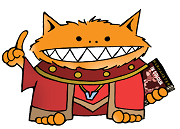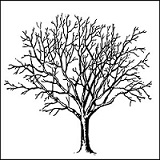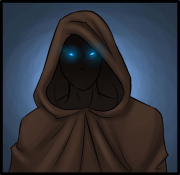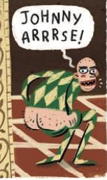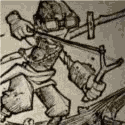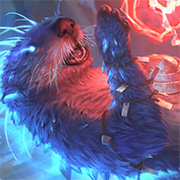|
 Duckman! A Duckman RPG! It's a bizarre, poorly bound, badly edited game by a fly-by-night company called Fantasy Strike Games, full of ludicrous rules dedicated solely to hindering every other player for your own small benefits.
|
|
|
|

|
| # ? Apr 19, 2024 19:05 |
|
Kudos to GimpInBlack for the review of Beyond the Wall! You can count me as another person who bought the game because of your endorsement! I'll be running the Enraged Fae scenario at a convention in a couple of months, I just need to figure out which of the playbooks to include: I agree with the general assessment here that the elf, dwarf and halfling play books seem like a poor fit for the genre of the game, but some of the new playbooks from the Village and Nobility packets are absolutely inspired. My main criticism of the game is that of all the three scenario packets available only one seems really worth it: Goblin Infestation is one of those scenarios which you could run in just about any retro clone and it doesn't seem to leverage the young adult fantasy vibe of the game, and Hidden Cult relies so heavily on the assumption of a Moorcockian cosmos (another bad fit for the game) that it just doesn't sit right with the game. Enraged Fae is a great scenario packet and I wish the others were more like it.
|
|
|
|
theironjef posted:
I don't have time to listen to it right now, but I still don't believe this exists
|
|
|
|
Eagerly awaiting the vitriolic response from legions of angry Duckman fans.
|
|
|
|
I haven't listened yet, but I'm wary that it may be an April Fool's. I already checked to see how long the episode is, so if it is a joke, you guys went the loving distance (or shat out nearly an hour of dead air?). It's too perfect. There are no clear indications this thing exists from a cursory Googling, but one of the top results is r/rpg on Reddit, pointing to this very podcast episode.
|
|
|
|
theironjef posted:Duckman! A Duckman RPG! It's a bizarre, poorly bound, badly edited game by a fly-by-night company called Fantasy Strike Games, full of ludicrous rules dedicated solely to hindering every other player for your own small benefits. This sounds thematically correct, at least.
|
|
|
|
I've had a slow morning at work, so even if it's fake, I'm working on a Seinfeld system hack for it. I'll post my preliminary rulea ideas later today.
|
|
|
|
theironjef posted:
How well do you think this would work for more modern misanthropic sitcoms? Would it work for Arrested Development or Always Sunny? I guess the craps-based thematics might be a little too hard to just use for other properties.
|
|
|
|
I've almost finished listening(I listen in the car while driving), and I think it is an April Fools' joke unless I missed something. Most characters have 0 for three stats, but HP is (DEX+APT)x2, meaning most characters will have 0 HP. I'm still gonna work on that Seinfeld system hack though. I'm gonna mix it a bit with DramaSystem to make scenes/episodes work.
|
|
|
|
A Fancy 400 lbs posted:I've almost finished listening(I listen in the car while driving), and I think it is an April Fools' joke unless I missed something. Most characters have 0 for three stats, but HP is (DEX+APT)x2, meaning most characters will have 0 HP. I'm still gonna work on that Seinfeld system hack though. I'm gonna mix it a bit with DramaSystem to make scenes/episodes work. Characters with 0 HP are lily-livered and dive like Romanian soccer players when challenged.
|
|
|
|
After reading about RPGs for Chi-Chian, Lawnmower Man, Ghost Dog, Rocky & Bullwinkle, and Dallas, the thought of a Duckman RPG only registered as mild surprise.
|
|
|
|
Wasn't the Dallas RPG just "How to Host a Murder" only the question always was "Who shot JR?"
|
|
|
|
unseenlibrarian posted:Wasn't the Dallas RPG just "How to Host a Murder" only the question always was "Who shot JR?"
|
|
|
|
unseenlibrarian posted:Wasn't the Dallas RPG just "How to Host a Murder" only the question always was "Who shot JR?" I had a friend who had a copy of the game back in the day (and no, we never played it). It was expected that you'd play characters from the show, so there was no character generation. There were several scenarios included, none of which involved shooting J. R. However, it was a PVP game -- each scenario had win conditions for the characters involved. I guess it would be kind of like running Amber, only with less dimension hopping and more Southern accents. I don't remember anything about the system itself, I'm afraid.
|
|
|
|
Burning Wheel Part 4: BITs, Artha and The Spokes in Play Here we get to the most important part of Burning Wheel - Beliefs, Instincts and Traits. Beliefs are fairly simple - what do you believe in? These are not just any old beliefs - simple belief in god doesn't count; nor does simple patriotism. These are the beliefs that are central to your character, and they are how you tell the GM what you want the game to be about. One example given is a peasant having the belief "I am the true king of this land" - this doesn't make it true, but it tells the GM that a portion of the game should be about this peasant and his attempts claim what he sees as being rightfully his. Instructor posted:Beliefs are meant to be challenged, betrayed and broken. Such emotional drama makes for a good game. If your character has the belief "I guard the prince's life with my own", and the prince is slain in the climax of the scenario, that's your chance to play out a tortured and dramatic scene and really go ballistic. A player can change his character's beliefs whenever he wishes - characters are meant to change over time, after all, and a change in beliefs is a part of that. The GM does have veto, however - if the change seems to be the player trying to wriggle out of an awkward situation, rather than the natural growth of the character. Instincts are fairly simple - they are a statement of what a character will automatically do in a certain situation. "Always draw my sword at the first sign of trouble," is a good one - and means that in combat, the character will usually have his sword drawn as soon as combat begins, rather than having to spend an action to do it. Another might be "When on patrol, always have bow drawn and an arrow nocked." If a thing is written as an instinct, then whether the player mentions it or not, it can be assumed to have happened. A player can choose to have his character not perform the action in an instinct (for example, he might choose not to draw his sword in spite of his instinct), but if the player follows an instinct that gets him into trouble, he receives Artha. Just like Beliefs, Instincts can be changed whenever the player wishes (usually at the end of a session). Traits, meanwhile, are important things about the character. Character traits, for example, mean that a character is easily distinguisable by that trait; call-on traits allow a once per session ability to either break a tie in their own favour, or to reroll failed dice as part of a test; and die traits adjust the way a skill or stat is rolled for a test. Changes to traits are voted for by the players as a group - both for adding new ones and for removing old ones that no longer make sense. After the chapter on Beliefs, Instincts and Traits, we move on to Artha. Artha is named after the sanskrit word, which means something along the lines of a person's power and success in their community or immediate surroundings, and there are three kinds of Artha: Fate, Persona and Deeds. Fate is gained through simply walking the character's destined path (that is, playing to their beliefs and instincts - even when it would cause them trouble), and is spent on minor boosts and aids. Persona is gained through very good role playing, accomplishing personal goals and being really useful to the group, and can be spent to modify die rolls. Finally, Deeds are earned by accomplishing important tasks through hard work and sacrifice, and can be spent to greatly modify a die roll. Fate can be spent to make 6s count as new dice to be rolled for potentially more successes, or to ignore a single superficial wound's worth of wound penalties. Persona can be spent to add additional dice to the test, to remove a single die of wound penalties, to prevent a time complication when using the working carefully rules for a test or to have a chance of surviving a mortal wound (if the persona point is not spent, the character is dead). Deeds may be spent to double the stat or skill being rolled for a test, or to reroll all the failed dice in a test. Up to one Fate, 3 Persona and 2 Deeds may be spent on a single die roll. Alternatively, a player may spent 5 Fate, 3 Persona and 1 Deed to gain what is called an Aristeia. This grants one of two benefits: it may allow a single stat or skill to be treated as one shade higher than usual for the length of a scene, or it may allow a player to ignore all wound penalties while attempting to achieve a simple goal. Once 3 Deeds, 10 Persona and 20 Fate have been spent on a stat or a skill, the character gets an Epiphany and the ability in question immediately and permanently becomes one shade higher. Finally, we have a small chapter on The Spokes in Play. This chapter begins with a quote from Vincent Baker in his own game, Dogs in the Vineyard, in which he says, Vincent Baker posted:Every moment of play, roll the dice or say yes. Instructor posted:Flip that around and it reveals a fundamental rule in Burning Wheel gameplay: When there is conflict, roll the dice. There is no social agreement for the resolution of conflict in this game. Roll the dice and let the obstacle system guide the outcome. Success or failure doesn't really matter. So long as the intent of the task is clearly stated, the story is going somewhere. The book then advises that the GM setting obstacles can affect the mood of a game - such that low obstacles make the game feel heroic and pulpy, while high obstacles can make the game feel dark and oppressive. instructor posted:The players have some role in setting this mood, but by far it is the GM's job to sculpt, pace and nudge the atmosphere in a certain direction. And not just through beautiful descriptions, he uses the game mechanics to reinforce those descriptions. Next, it says to always use Versus Tests for conflict between any two characters - be it social conflict, physical conflict or anything else where a mechanic exists. The main reason it gives is that this keeps things fair, and allows players to use all of the mechanics at their disposal to influence events. instructor posted:Why roll at all? Why not just agree on what's happening? We're all fair minded adults, right? Well, social agreement is a fantastic idea, but it is subject to bullying, blustering, intimidation, manipulation, cajoling, persuasion and lying; all things that are separate from the characters - part of a social dynamic that is apart from the game. By relying on dice, everyone is on a level playing field. Burning Wheel is a game, not an acting class. The versus tests get everyone playing the game. Besides, your characters only advance if you roll the dice! Finally, the book says to stop reading the rules, and to start creating characters and playing the game with the rules we already have - and that seems like an excellent suggestion. I open it up to the floor - what kinds of characters would you like to see me create as I look at the next portion of the book: The Character Burner? Bear in mind that this is a fantasy game, with the standard humans, elves and dwarves, but not much more.
|
|
|
|
I suspect Duckman is an April Fool, but it's up with the iCade as April Fool's that probably ought to be actually made.
|
|
|
|
I happen to have Burning Wheel and know it has rules for trade in the back, so how about we forget about blood and violence for a short moment and make a traveling merchant? Incidentally, it's great to see you tackling this game. Burning Wheel is very dense a game, and it's nice to have someone explain it out to me. Heck, maybe I get around to playing it one day.
|
|
|
|
hectorgrey posted:Finally, the book says to stop reading the rules, and to start creating characters and playing the game with the rules we already have - and that seems like an excellent suggestion. I open it up to the floor - what kinds of characters would you like to see me create as I look at the next portion of the book: The Character Burner? Bear in mind that this is a fantasy game, with the standard humans, elves and dwarves, but not much more. A dwarf trader turned merchant adventurer after eloping with a noble's daughter. He also did a tour of duty in the dwarven military. (You should do an elf or dwarf to show of their unique emotional things)
|
|
|
|
Siivola posted:I happen to have Burning Wheel and know it has rules for trade in the back, so how about we forget about blood and violence for a short moment and make a traveling merchant? This is as much for my benefit as anyone else's - maybe if I can explain half the stuff in The Rim to you guys, I might end up understanding it myself too.
|
|
|
|
Man, Beyond The Wall's looking pretty nifty. Hope it can continue that trend.GimpInBlack posted:The thing that baffles me is that, as jacked as the probabilities are, they published a chart of the probabilities in the book. Like, how do you look at that chart and not go "hmm, that's a lot of 95%+ results. Maybe I should rethink these numbers?" How do you eff up what is essentially a modified D6 System? Fight! - The Fighting Game RPG  Chapter 1: Character Generation The chapter starts of with your typical "What kind of character do you want, anyways?" section, encouraging you to think about stuff like your PCs fighting style or his blood type (because Japan does not approve of the zodiac as a means of arbitrary personality archetypes, unless you count that weird zodiac with koalas and unicorns they have currently going on). We also learn that PCs and important NPCs are called "Fighters", able to pull off physics-defying stunts and treat just about everyone else as cannon fodder. It's a bit like a World of Darkness game in that regard, right down to being part of an underground society (in most campaigns, at least). So that's why they made that Street Fighter Storyteller game! Anyhow, this chapter is probably the weakest when it comes to editing. The layout makes it easy to glance over stuff like the "This happens when you level up"-section, and some statistic groups have very similar names, but aren't really all that related. Nothing major, really. Just takes another look or two. Oh well, that's why you have me around. A Fighter is composed of the following values: Power Level Fight! is a level-based system, though you sadly can't reach over 9,000 (or 8,000, depending on your translation). Power Levels (or PLs for short) go from 1 to 8, with the campaign's final antagonist having a PL of 9 or even 10 (because fighting game developers love broken boss characters). It should be noted that the first 2 PLs are actually some sort of tutorial phase, as Fighters are very limited in what they can do during this period (the book thankfully gives some guidelines on how to make the most out of it). PL 3 is where Fighters are much more well-rounded, and they get access to Super Moves from that point on, so feel free to start there once you're familiar with the rules. (Though not mentioned in the book, using fixed PLs could probably be used to mimic tier lists, if you're into that sort of thing.) Life Bar, Fighting Spirit & Super Bar Probably your most important values to keep track of in combat. The first on is your hit points (depending solely on your PL and nothing else), the other one is a mixture of a Fighter's willpower and concentration (as well as his fictional player's, if you're playing meta-gamey). Any combat-related roll that is not a damage roll can be beefed up with the expenditure of Fighting Spirit. Unlike Life Bar, Fighting Spirit can be easily recharged during combat and increased beyond it's base value. Having lots of Fighting Spirit is quite useful if you want to make a rushdown character, as your opponent will sooner or later have to play defensively to recover his smaller Fighting Spirit pool. The Super Bar becomes available starting with PL 3 when you can get your first Super Move, and it fills up just like in most fighting games (aka hit or be hit). You can also charge it like a DBZ character. Unlike the Life Bar and Fighting Spirit, the Super Bar does not depend on your PL and stays the same for everyone. How much energy the Bar can store (or if Super Moves even exist in the first place) and other details are decided by the GM in advance. The default is a simple bar that goes to 10 (the base cost for a Super Move). Basic Qualities These are your attributes/stats. Fight! cuts off a lot of bullshit compared to its ancestors here, reducing the choice to the only stats with combat application: Strength, Speed and Stamina. They can range from -1 and 2 and are mostly used for die shifts for one specific (but often used) die roll: Strength affects your physical damage, Stamina affects incoming damage, and each point of Speed either goes into your Initiative (how fast you act) or Control (how much you can do when you act). In a way similar to oldschool D&D, Basic Qualities are set in stone for the reminder of your Fighter's career, and since the game only allows for 9 possibile distributions (a balanced spread of 1/1/0 or a specialized spread of 2/0/-1, each with 3 combinations; +7 distributions if you include the different ways you can split your Speed rating), they essentially determine your Fighters archetype. Qualities (Maybe not the best name as we just had "Basic Qualities") A catch-all term for your advantages and special abilities, Qualities can make you a cute little witch girl with an adorable pet, or a scary tough guy with a theme as cool as Guile's. You start off with 4 of these and can get more by leveling up. Weaknesses Your disadvantages, like being an ugly dude with a glass jaw. Having these gives you more Qualities. Quirks Personality quirks that migth result in roleplaying-related problems or conflicts (in fact you want this do happen as this gives you Story Points, this game's FATE/brownie/whatever points that can only be used outside of combat), but aren't as severe as to count as Weaknesses (though the whole package counts as one Weakness if you have a lot of Quirks). Every Fighter is encouraged to have at least 1-2 of those. Skills Skills in Fight! are separeted into Combat Skills and Non-Combat Skills. Combat Skills flesh out a Fighter's style (or repesent the skill of the Fighter's fictional player), while Non-combat skills (aka the normal skills) are purely for roleplaying scenes aside from the sub-category of "Mechanical Skills" that are put to use in the combat sub-systems. The main combat rules don't really use these, with maybe one exception. Combat Skills include the game's 3 kinds of Armor Class (Defense, Evasion, Tactics), Ki (ranged attack damage and your ability to cancel out enemy Hadokens with your own) and Combo (how many attacks you can string together; yes, a Combo of 1 does nothing. It's a point tax for low-PL Fighters). There are no Combat Skill for hitting stuff, as not getting hit in fighting games is the truly challenging part. Besides the three ACs (which have a strict limit) and Combo (which can go as high as you want, though you should make sure that you can actually dish out tah many attacks), all skills can go up to 10. Interestingly, you can already reach this limit at PL4, so you can be the world's greatest, roundhouse-kicking quantum physicist without having to be [insert the most impossible fighting game boss you can think of. My money's on Demon Gaoh. Gently caress that guy.]. Having a higher PL just means you're the best in more stuff and dish out way more hurt. If you're worried about possible min-maxing, rest assured that Combat and Non-Combat Skills are bought with different kinds of points. Combat Bonuses Starting with PL2, you get to put points into Combat Bonuses, which act as static bonuses to things like your Accuracy or all of the three kinds of defenses. There is no Combat Bonus for Initiative, so you're never guaranteed to go first. They serve to customize your Fighter and can either emphasize your strengths or try to cover up your weaknesses (like giving your Strength -1 fighter a damage bonus). Thankfully, Combat Bonuses have very strict level-dependent, smallish upper limits, so even the highest-PL Fighters can't just casually dodge attacks from n00bs with no effort. Special Moves Of course this wouldn't be a fighting game without some special moves. I'll cover them in more detail in their own chapter, but here's a first summary: Unlike the Street Fighter RPG and Thrash, special moves in Fight! are fully effects-based: There's just one kind of special move to buy, but you can customize it up the whazoo to mimic just about everything seen in the video games (though you need the "Round 2" book if you want to go for Fatalities or the more crazy stuff seen in Guilty Gear or BlazBlue). The higher the level of the Special Move you buy (usually 2-5), the stronger you can make them, but they also become harder to pull off. Super Moves are suped-up Special Moves. They require Super Energy to perform, but you can add way more stuff to them, including Super-Move exclusive goodies that essentially replicate the large hit boxes and invincibility frames they tend to have. While you can have as many Special Moves as you can afford, you can only have a specific number of Super Moves depending on your PL. Special and Super Moves are bought with Move Points, which everyone gets the same amount of depending on their PL. You can convert these points into Skill points (either combat or non-combat) or Fighting Spirit, but you have to buy at least one new Special Move per PL, unless you specifically "complete" your Fighter's Move List, from which point on you can't buy any more moves. Glory Your XP. You get them for good roleplaying, winning fights, fighting honorable, and hitting people with Special Moves (but only once per single Special Move per combat, so keep it varied). If that's too much bookkeeping, the GM can just keep it more freeform and hand out Glory or direct level ups as he sees fit. Heroes and Supporting Characters For a Buffy-esque campaign, the players can select one of their Fighters as the "hero" (I presume there's nothing against having more than one), with the rest being supporting characters. This modifies the starting points and growth rate of a Fighter's Combat and Non-combat skill points, turning them from balanced characters into either D&D Fighters or Rogues. Overall, a like the tight focus on combat-only stats. We've already read about plenty of roleplaying games heralding themselves as the bestest, most flexible universal/fantasy/whathaveyou system ever made, only to then include stuff like obvious god stats or classes whose abilities are around 98% combat-related. Fight! is pretty honest about the kind of campaigns it supports, with no bullshitting around. Combat's pretty important, so it makes sure that every Figher is competent in that area (even if that means that an underaged schoolgirl can beat up an entire biker gang, though that is accurate to the source material). There's also really not much min-maxing you can do. Specialized Fighters can be quite powerful with their one Basic Quality at 2, but that required -1 will hurt them no matter where they put it. The closest you could get to a dump stat would be Strength for Hadoken-spammers, but that path requires patience and careful planning if you don't want to end up as a one-trick pony. Next Time: Chapters 2+3 for Qualities, Weaknesses, Quirks and Skills, as well as the first example character or two (sans special moves for the moment). There's currently lots of talk about bears. You wanna see a bear?!
|
|
|
|
theironjef posted:
The Craps resolution system sounds so weird, but kind of fun. I'd definitely spend a night playing this with friends while enjoying brown liquors. Please turn this misanthropic fantasy into a reality.
|
|
|
|
Duckman sounds like the kind of game I'd love to play when we're down a person and just want something to kill time, but there's no way it could happen because I've got a player who just gets super sad when any minor bad thing happens to his characters.
|
|
|
|
So, Seinfeld or A Game About Nothing: Action resolution stays the same(craps) Three stats: Inane, Neurotic and Eccentric Set one stat as +(can add a +1 to any roll involving that stat), one to =(no special actions on that stat), one to -(other players can subtract from your rolls on that stat). Kramer, for instance is E+,N=,I- Each character also starts with 5 twist points At the beginning of the game, choose a turn order through whatever method your group likes(rolling, clockwise, rps, etc) In turn order, each player declares an episode goal, the next player declares the major complication that will impair the previous player(though not make it impossible to complete), with the initial player deciding the last player's complication at the end. In order, each player will set a scene where they attempt to accomplish something related to their goal. Which players are involved will be decided by consensus, though the GM should override if one player is being excluded or is trying to hog every scene. The GM will play NPCs, though they may allow another non-participating player to play one to make it easier. When a player takes an action that would move the plot forward, they roll craps against the stat most closely related to their actions as decided by the GM. Before the roll(and only before the roll), if that roll is the player's - stat, any other player may spend a twist point to subtract one from the result. If the roll changes from positive to negative, the player who invoked the minus gains 1 twist point. If it changes from negative to positive, the player rolling gains 1 twist point. If it changes from negative to mega-negative, there are no changes to anyone's twist points but the invoking player can influence how the failure occurs. If the result doesn't change the twist point is burned. After 3-5 times around the table(to the group's taste and depending on group size), the episode concludes. If you met your goal, you win. If you didn't, you lose. If no one meets their's, whoever has the most twist points remaining wins. Thoughts as a basic framework?
|
|
|
|
Doresh posted:Man, Beyond The Wall's looking pretty nifty. Hope it can continue that trend. We're almost done with the core book, I'm just trying to figure out the best way to make reviewing what's essentially a big list of spells and monsters interesting. Further Afield will be up next, which is a really cool supplement. Doresh posted:How do you eff up what is essentially a modified D6 System? By turning it into a roll-and-keep system where the default difficulty is 9 and yet it's trivially easy to start with a character who keeps the best 5 out of 8-9 dice rolled. Basically the game works okay if everybody is a jack of all trades, slightly better at one, but there's absolutely nothing stopping you from making a specialist character that breaks a large chunk of the game over your knee. Doresh posted:Next Time: Chapters 2+3 for Qualities, Weaknesses, Quirks and Skills, as well as the first example character or two (sans special moves for the moment). There's currently lots of talk about bears. You wanna see a bear?! I'm gonna go ahead and say every character creation example should include a bear.
|
|
|
|
A Fancy 400 lbs posted:So, Seinfeld or A Game About Nothing: I like it! Of course I have this other thing I'm working on.
|
|
|
|
GimpInBlack posted:We're almost done with the core book, I'm just trying to figure out the best way to make reviewing what's essentially a big list of spells and monsters interesting. Further Afield will be up next, which is a really cool supplement. Brb making a bear in Log Horizon
|
|
|
|
GimpInBlack posted:I'm gonna go ahead and say every character creation example should include a bear. Well I've got that covered for you no problem  Speaking of, I'll try to finish the next chapter either tonight or tomorrow. Who likes page after page of merits of spurious value?
|
|
|
|
Kurieg posted:Well I've got that covered for you no problem Put a twist on it. Make a bear that has the soul of an elephant.
|
|
|
|
Kai Tave posted:I'm with Halloween Jack in that I'm genuinely baffled that anyone can muster that much passion to get up in arms over slights against the BRP system of all things. Like goddamn, when you imagine the most dry, sterile d100 gaming system whose most evocative quality is "is functionally a game" it's BRP you're imagining.
|
|
|
|
Honestly, I rather like BRP and its derivatives. Call of Cthulhu is a lot of fun (though I actually think Trail of Cthulhu does it better), and the more recent editions of Runequest (specifically since Mongoose took over the license but also including Design Mechanism's stuff) feel like a better D&D. That said, I'm going to go ahead and sit on the fence and suggest that maybe, just maybe, if we all got on with having fun playing whichever elfgames make us happy instead of demanding that everyone enjoy the same things we do, we'd all be having a lot more fun. I'm not saying that games are immune to criticism - after all, without criticism how can games improve? I'm just saying that maybe those of us playing games that others consider to be bad games should stop taking it as a personal attack and just play more games...
|
|
|
|
hectorgrey posted:Honestly, I rather like BRP and its derivatives. Call of Cthulhu is a lot of fun (though I actually think Trail of Cthulhu does it better), and the more recent editions of Runequest (specifically since Mongoose took over the license but also including Design Mechanism's stuff) feel like a better D&D. That said, I'm going to go ahead and sit on the fence and suggest that maybe, just maybe, if we all got on with having fun playing whichever elfgames make us happy instead of demanding that everyone enjoy the same things we do, we'd all be having a lot more fun. I'm not saying that games are immune to criticism - after all, without criticism how can games improve? I'm just saying that maybe those of us playing games that others consider to be bad games should stop taking it as a personal attack and just play more games... I believe you guys are on the same page, since Halloween Jack is more or less just laughing at a die-hard defender of BRP trying to fend off any criticism (mild or otherwise) of it with righteous anger. I have no problem with the system either, it's a workhorse, but in Stormbringer 4th edition, someone tried to load it like it was a work elephant, and the result was Elric having an 880% chance to hit. theironjef fucked around with this message at 21:27 on Apr 1, 2015 |
|
|
|
As a system BRP works just fine. It's pretty simple to grasp and explain, etc. It's just *bland*. There's not a lot of flavor to it outside of the skill list, and my eyes are glazing over just thinking about trying to convey tone or theme through that medium.
|
|
|
|
hectorgrey posted:Honestly, I rather like BRP and its derivatives. Call of Cthulhu is a lot of fun (though I actually think Trail of Cthulhu does it better), and the more recent editions of Runequest (specifically since Mongoose took over the license but also including Design Mechanism's stuff) feel like a better D&D. That said, I'm going to go ahead and sit on the fence and suggest that maybe, just maybe, if we all got on with having fun playing whichever elfgames make us happy instead of demanding that everyone enjoy the same things we do, we'd all be having a lot more fun. I'm not saying that games are immune to criticism - after all, without criticism how can games improve? I'm just saying that maybe those of us playing games that others consider to be bad games should stop taking it as a personal attack and just play more games... Oh, I think BRP is a totally functional thing; you can do lots with it and it has a lot of potential. Like rice, or cotton, or blank printer paper.
|
|
|
|
Tolan posted:As a system BRP works just fine. It's pretty simple to grasp and explain, etc. It's just *bland*. There's not a lot of flavor to it outside of the skill list, and my eyes are glazing over just thinking about trying to convey tone or theme through that medium. It's when you add demon summoning and chaos/law points (Stormbringer) or sanity points and squamous monsters (Call of Cthulhu) or combat maneuvers and weird cults and multiple magic systems (Runequest) that they start to become interesting.
|
|
|
|
theironjef posted:I believe you guys are on the same page, since Halloween Jack is more or less just laughing at a die-hard defender of BRP trying to fend off any criticism (mild or otherwise) of it with righteous anger. I have no problem with the system either, it's a workhorse, but in Stormbringer 4th edition, someone tried to load it like it was a work elephant, and the result was Elric having an 880% chance to hit. ... OK, that's just a little stupid. I do have a copy of Elric, and on double checking, in that book Elric had 105%, but Stormbringer has 880%. I have a funny feeling this is yet another example of important NPCs being made as unkillable as possible (unfortunately a common problem back in the 90s). Halloween Jack posted:Oh, I think BRP is a totally functional thing; you can do lots with it and it has a lot of potential. Like rice, or cotton, or blank printer paper. lol. That I can agree with. Much like GURPS, it suffers the problem that comes with being a generic system - that the GM has to do all the work when it comes to adding flavour (unless you're playing one of the derivatives, which makes that easier). I could see myself using it for the right campaign, just as I could see myself using GURPS for the right campaign, but in either case it'd take a lot of work up front - I'd only do it if there weren't a more specific system suited to my needs...
|
|
|
|
I've never understood why BRP, despite using entirely reasonable percentiles for skills, insists on having stats in the 1-20 range. I don't want to have to calculate the x3 and x5 of 13 all the time, damnit! Every time I point this out to my dyed-in-the-wool CoC/BRP most-perfect-game friend, I just get a shrug and a, "That's how Sandy did it." But aside from that, it's a pretty fantastic generic system, and intuitive in a way that GURPS and Hero just aren't.
|
|
|
|
kaynorr posted:I've never understood why BRP, despite using entirely reasonable percentiles for skills, insists on having stats in the 1-20 range. I don't want to have to calculate the x3 and x5 of 13 all the time, damnit! Every time I point this out to my dyed-in-the-wool CoC/BRP most-perfect-game friend, I just get a shrug and a, "That's how Sandy did it."
|
|
|
|
hectorgrey posted:... OK, that's just a little stupid. I do have a copy of Elric, and on double checking, in that book Elric had 105%, but Stormbringer has 880%. I have a funny feeling this is yet another example of important NPCs being made as unkillable as possible (unfortunately a common problem back in the 90s). I was treating that distinction as basically academic, it's not like the party is supposed to get the sword from him. Treating it as relevant just makes me angry, because the only words used to describe this guy are stuff like sickly, weak, deficient, pale, and damaged, none of which inspire me to think "Cannot miss with a sword."
|
|
|
|
So, it turns out that Mr Harris from Channel M hasn't been idle. He also hasn't learned. He's just put out a whole wave of new stuff, none of which is edited. First of all, there's the Witch Girls Adventures Coloring Book, which is exactly what it sounds like: a collection of line-drawn art to color in. And is sold as a PDF, but hey, you can print it out, right? The preview pages for this book actually show some quite charming children's fantasy artwork, like a girl cutting out paper butterflies which come to life and spin around her. And in fact, many of the pictures in the book are of that type, and would make it genuinely a good piece of work that would be delightful and enjoyable for your little girl (or boy), except that at some point she'll turn a page and see this:  Do make sure to color the tears on her screaming, distorted face, won't you? Next up is Magical Minutia: Harqiinli. It's the first Magical Minutia book, which we are told will be a series of free supplements which add new features and errata to WGA. This is a fairly clasic model that Channel M are adopting, but they've introduced their own twist to it by making this "free" supplement cost 50c. Harqiinli, as the name probably suggests, are evil clowns which the book constantly reminds us "look like clowns". The strange thing is that there seems to be no reason at all for them to be evil. Their function, it seems, is to make people laugh so they can "drain humor" from them and use it to remain alive. If they drain a target without enough humor, they start taking Life points and eventually kill them, but there seems to be no benefit for the Harqiinli for doing that. They're mentioned as getting involved with evil pranks because they have "a childlike understanding of the world" and don't know what harm they're doing. Which seems a bit odd, since literally the first thing they'd learn is that laughing guy = humor energy, dead guy = none. It also throws in a comedy skill which can heal wounds (screw inspiring people, his hand grew back because we told him a joke!), and some "comedy" spells which are basically just real comedy props turned into spells for no reason, like spending 1 Zap point to spray someone with silly string, instead of - y'know - using actual silly string (which is especially daft when you consider there's a trait that lets you spend 1 Zap to summon any mundane practical joke item). While we're on the subject of excuses for being evil, how about Annabelle DeVille's Guild to Mystical Mayhem (yes, "guild"). It has an opening comic in which two witches (Lucinda and the titular Annabelle) barge into a restaurant and insult the waitress, and then when the cafe owner intervenes (for no particular reason, since what they say to the waitress is probably no worse than what waitresses hear every day), the witches murder a total of 14 innocent people and then burn down the town. Ironically, the first pages of the book then state that they use the word "wicked" and not "evil" to describe these witches because they are talking about "story book villainy and not real world style madness and atrocities." Hmm. But the highlight is Witch Girls: Respelled. See, remember how a while ago there was a Kickstarter to do a sequel to the original WGA, called Book of Shadows, and it didn't deliver anything? And that the Director's Cit, which System Mastery review, was explicitly described as the original version reprinted with "a few extras" from Book of Shadows? Well, it seems that they gave up on Book of Shadows and split it into a bunch of smaller books, and Respelled is the first of those, being the updated system. By which we mean that most of it is copy-pasted from the Director's Cit. They also made it a non-searchable PDF, whereas DC was searchable. The only really significant change to the rules is the Maximum Die rule. That's as follows: if you roll the maximum on a die and still fail, you can spend Zap points or Adventure points on a 1:1 basis to increase the roll until you succeed. This is.. weird. The author's obviously trying to deal with the hard boundaries that come about when using a die type based system; as in, if someone else has a +6 modifier in a skill and you have a d4 in the stat that resists it, you can't possibly succeed. Now, you can, but only if you roll a 4 and you have to spend some points. Sounds good, but there's a big problem, which I'm sure most readers have already spotted: smaller dice roll their maximum values more often than larger dice do. The math comes out within a hair's breadth of being inverted; a d8 still has a better chance of beating a d12 than a d4 does, but only by 3%. The effect is that having a higher stat lets you do things less reliably at no cost, whereas a lower stat means you can more reliably succeed when you have the points available to spend. This has the germ of a REALLY good mechanic - for playing classic anti-heroes who are usually mediocre can pull off spectacular feats on the rare occasion when it really matters - but I'm just not sure it hangs together and I'm not convinced that's deliberate. Oh, and in case you're wondering what Adventure points are, so is everyone else. They're never mentioned again in the book. So far, there's not a lot else changed apart from some extra character generation options which ironically make Punch Witch even stronger. Rustics, for example, can load spells into arrows and fire them at people; the arrow can do arrow damage if you want, or do nothing, but the spell takes effect on the target. The reason to do this? The spell can't be resisted with Resist Magic if the arrow hits, you have to dodge the arrow with Reflexes. Guess what secondary stat Punch Witch has at a higher value than everyone else? CLASS: WITCH (GIRL) Driver: Apathy Good: Black Magic: When you're trying to inflict harm on a non-PC who isn't opposing or threatening you, PCs can't mess with you. Bad: Math is Editing: Once a day another player can make you roll a d20 instead of 2d6, provided they make an argument as to why it must be statistically better to do so. If this causes you to fail, they gain 1xp. Ugly: Twice a day you can interrupt someone's task by turning them into something random. This makes them fail at that task and they stay in that form for 2 more rolls. In that time they can't have their form changed again. If they can argue that being in their new form is helpful on something they are doing, they can claim +1 on that. You gain 1xp if they do not succeed on any of the rolls they make while in their new form. hyphz fucked around with this message at 23:23 on Apr 1, 2015 |
|
|
|

|
| # ? Apr 19, 2024 19:05 |
|
There's a certain satisfaction to be gained in the worst edited game I've ever read having a supplement called Respelled.
|
|
|






